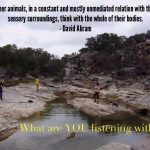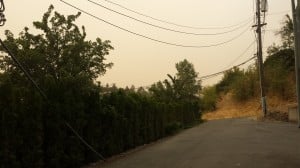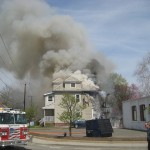Last week, stuck in the Southeastern Snowmageddon, it looked as if I might not make it to Seattle at all, but Friday morning, before the sun dared even think about creeping up over the horizon, I climbed into a taxi and rode on icy streets to the Greensboro airport. I had been rebooked for free on a series of flights one day later than I’d originally booked because of the weather. The weather was still icy, but at least it wasn’t actively snowing that morning. Even so, the plane took off late. The second plane was even later. I missed the third plane entirely and had to cross my fingers and hope that my standby request would get me on a flight that would allow me to at least spend time at the post-funeral reception, even though I missed the funeral itself. The gods took pity, and I arrived in Seattle exactly as my friends were climbing into carpools to leave the beach where they burned the boat to come to the house where they would drown their sorrows.
I wasn’t there to see the 40+ people who arrived at the funeral. I didn’t get to see the arm wrestling, the carrying of the log, or the handful of goths who stripped down to their underwear to run into the freezing cold water in feats of strength. I didn’t get to listen to the stories that made people laugh so hard they cried. I didn’t get to listen to the music that our friend had composed while she was alive. I didn’t get to listen to the death metal tribute written and performed by another of our group of friends. I imagine it and I am warmed and amused at such awesome and weird friends, gathered because they all loved someone they would never see again.
As I stood on the platform outside the airport waiting for the Northbound light rail, it suddenly hit me that I needed to buy lox, bagels, cream cheese and tomatoes, as those are the foods I’ve had at every funeral I’ve ever been to. I laughed at myself for “mourning like a Jew”, even in the company of a bunch of gentiles, but I stopped at the store across the street from the house where the reception was held to buy these important items.
I arrived at the house within moments of the first reception guests. They were taking off their shoes at the door, just as I walked up the front steps. I walked in, put my food with the other food, and grabbed a bottle of hard cider before sitting next to a group of people who were settling into the living room.
It was a night full of talking, food and booze. Some people left early, others arrived late, but the party continued on until the last person fell asleep wrapped in blankets on the living room floor at about 4 in the morning.
The most important conversation of the night started around midnight outside in the backyard amongst a group that had gone out to smoke. The people at the funeral came from several overlapping and interlocking groups of friends, but several of those groups had stopped talking to each other in recent years. Arguments that happened one year ago, two years ago, or more, had created rifts between subgroups, and the members of those subgroups had only been caught alive in each other’s company because one of their shared friends was dead. The group of people in the backyard included several people who had been on the outs with each other for some time, who were surprised to realize that they missed each other and really liked each other, despite the difficulties they’d had in the past.
The discussion led to a question of why the community had split and shattered. They talked about the way that certain people, when hurt, would tell others that they should no longer be friends with the person who had hurt them and how this divided the group. The discussed the difference between healthy boundaries and where people had just split friends because of personal grudges. And then they asked how they could keep the community together in the future.
I shared my experience in keeping a community of volunteers, despite many personal difficulties within the group. The key was the core value of the group: the reason they were together in the first place. The difference between holding a group of non profit volunteers together as a community and keeping a group of friends together, though, is that the volunteers have an explicit understanding of what the core value of their community group is. A group of friends doesn’t have that unless they stop to think about what exactly it is that they all have in common.
This group of friends, in Seattle, exists because we are creative, intelligent people, aware that the world around us is a bit messed up, the system is broken and just fitting in isn’t good enough. We are all trying to find ways to live better, not based on wealth and the values of the dominant culture around us, but based on values of health and justice. Having made that explicit, it became clear why it is so important for us to do the work to heal the rifts in the community when they come up, and not just at funerals.
A dear friend of mine hates the notion of “intentional communities”. He says that the most important communities are the unintentional ones, the ones that happen just because you live in a place and you run into the same people every day whether you like it or not. I love intentional communities, but I also love the unintentional ones.
















